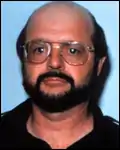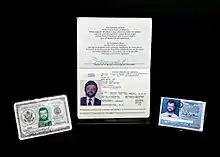John Anthony Walker
John Anthony Walker, Jr., né le à Washington et mort le au complexe correctionnel fédéral de Butner, était un officier marinier supérieur spécialiste des communications de l'US Navy, qui espionna pour le compte de l'Union soviétique de 1968 à 1985. C'est l'une des affaires d'espionnage les plus dommageables des États-Unis.

| Naissance | |
|---|---|
| Décès | |
| Nationalité | |
| Activité |
| A travaillé pour | |
|---|---|
| Arme | |
| Grade militaire | |
| Condamné pour |

Biographie
John Walker est né à Scranton en Pennsylvanie et a eu une enfance malheureuse avec des parents séparés et alcooliques. Il abandonna le lycée sans diplôme et s'engagea dans l'US Navy en 1955. Il s'y montra compétent et devint Chief Warrant Officer affecté à des postes sensibles des communications.
En 1968, ayant des problèmes d'argent, Walker entra à l'ambassade soviétique de Washington et offrit des informations classées secret défense en échange d'argent. Il poursuivit son activité d'espionnage pendant plus de dix-sept ans, fournissant régulièrement au KGB des cartes de clés de chiffrement et des informations sur les machines à chiffrer. Il recruta comme complices un de ses collègues, Jerry Alfred Whitworth, puis son frère, Arthur James Walker, et son propre fils, Michael Lance Walker.
Selon le transfuge du KGB Vitali Iourtchenko, le réseau Walker était l'opération la plus importante du KGB et les informations obtenues auraient permis de décrypter un million de messages de la marine américaine.
Les membres du « réseau Walker » furent arrêtés après que l'ex-épouse de John, Barbara Walker, eut informé le Federal Bureau of Investigation en 1985. John Walker plaida coupable et témoigna contre Whitworth dans le cadre d'une peine négociée clémente pour son fils[1]. John Walker et Arthur Walker furent tous deux condamnés à perpétuité et sont décédés en prison en 2014[2]. Jerry Whitworth fut condamné à 365 ans de prison. Michael Walker fut condamné à 25 ans de prison et fut libéré après 15 ans[3].
Notes et références
- (en) Frank J. Rafalko (dir.), A Counterintelligence Reader, vol. 3 : Post-World War II to Closing the 20th Century, Washington, National Counterintelligence Center, (lire en ligne), p. 233-235.
- (en) Douglas Martin, « Arthur J. Walker, Part of Family Espionage Ring, Dies at 79 », The New York Times, (lire en ligne
 , consulté le ).
, consulté le ). - (en) Lori A. Nolin, « Spy figure calls Cape a place to start over », sur www.capecodtimes.com, (consulté le ).
Bibliographie
- (en) Thomas B. Allen et Norman Polmar, Merchants of Treason : America's Secrets for Sale, New York, Delacorte Press, , 378 p. (ISBN 0-385-29591-X) — Livre sur plusieurs affaires d'espionnage américaines, l'affaire Walker occupe environ la moitié du livre.
- (en) John Barron, Breaking the Ring: The Bizarre Case of the Walker Family Spy Ring, Boston, Houghton Mifflin, 1987 (ISBN 0-395-42110-1)
- (en) Howard Blum, I Pledge Allegiance: The True Story of the Walkers: an American Spy Family, Simon & Schuster Books, 1987 (ISBN 0-671-62614-0)
- (en) Jack Kneece, Family Treason: The Walker Spy Case, Paperjacks, 1988 (ISBN 0-7701-0793-1)
- (en) Robert W. Hunter, Spy Hunter: Inside the FBI Investigation of the Walker Espionage Case, Naval Institute Press, 1999 (ISBN 1-55750-349-4)
- (en) Pete Earley, Family of Spies: Inside the John Walker Spy Ring, Bantam Books, 1989 (ISBN 0-553-28222-0)
- (en) "The Navy's Biggest Betrayal", Naval History Magazine
- (en) John Anthony Walker, My Life as a Spy, Amherst (État de New York), Prometheus Books, 2008 (ISBN 978-1-59102-659-4)
- (en) Laura Walker, Daughter of Deceit: The Human Drama Behind the Walker Spy Case, W Pub Group, 1988, (ISBN 978-0849906596)
- (en) Laura J. Heath, An Analysis of the Systemic Security Weaknesses of the U.S. Navy Fleet Broadcasting System, 1967-1974, as Exploited by CWO John Walker, Fort Leavensworth, Kansas, US Army Command and General Staff College, 2005 [lire en ligne (page consultée le 29 avril 2017)]